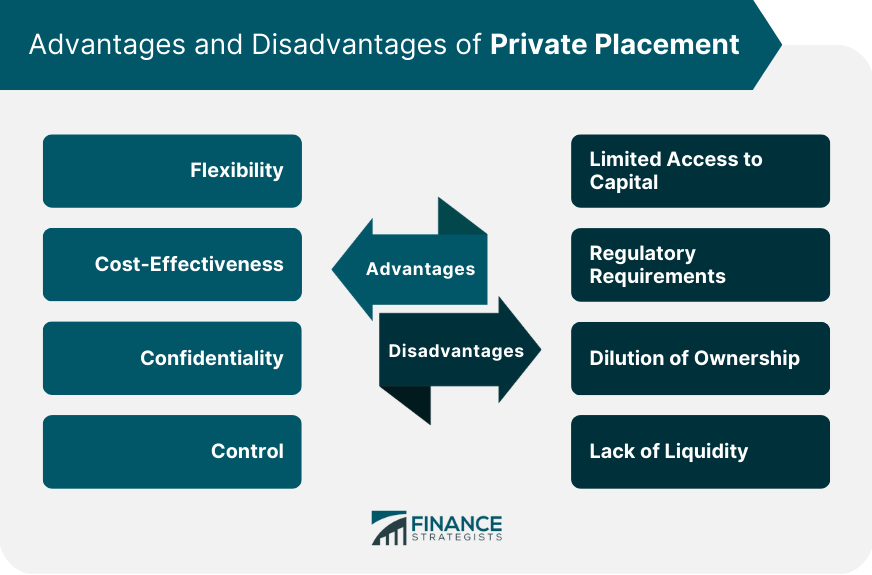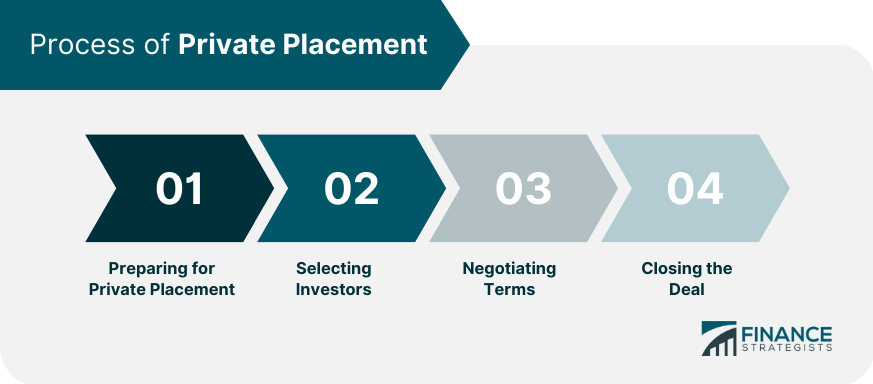Private placement refers to the sale of securities to a select group of investors, rather than to the general public. Private placements are typically offered to accredited investors, such as high net worth individuals or institutions, and are exempt from many of the regulatory requirements that apply to public offerings. Private placement allows companies to raise capital without going public and offers investors the opportunity to invest in promising businesses that may not be available through public offerings. Private placement can also provide companies with greater flexibility and control over their financing options. Private placement is subject to securities laws and regulations, including the Securities Act of 1933 and the Dodd-Frank Act. Issuers must comply with applicable regulations when offering securities through private placement to avoid potential legal and regulatory consequences. Equity private placement involves the sale of ownership interests in a company, such as common or preferred stock. Equity private placement allows companies to raise capital by selling ownership stakes in the company to investors. Investors in equity private placement may receive dividends and may benefit from capital appreciation if the company performs well. Debt private placement involves the sale of debt securities, such as bonds or notes, to investors. Debt private placement allows companies to raise capital by borrowing money from investors and agreeing to pay interest and repay the principal over time. Investors in debt private placement may receive regular interest payments and may benefit from the repayment of the principal at the end of the term. Convertible private placement involves the sale of securities that can be converted into equity or debt securities at a later time. Convertible private placement allows companies to raise capital through debt or equity offerings, depending on market conditions and investor demand. Investors in convertible private placement may benefit from potential capital appreciation if the securities are converted into equity, or from regular interest payments if the securities are converted into debt. Hybrid private placement involves the sale of securities that combine features of both equity and debt securities. Hybrid private placement allows companies to raise capital while providing investors with a flexible investment option that may include regular interest payments and potential capital appreciation. Investors in hybrid private placement may benefit from a combination of regular interest payments and potential capital appreciation, depending on the terms of the securities. Private placement offers companies greater flexibility in their financing options than public offerings. Companies can customize the terms of their private placement offerings to meet their specific needs and investor demand. Private placement can also be structured to allow companies to raise capital quickly and efficiently, without the time-consuming and costly process of preparing for a public offering. Private placement can be a cost-effective way for companies to raise capital. Private placement offerings are exempt from many of the regulatory requirements that apply to public offerings, which can significantly reduce the costs associated with offering securities. Private placement can also be more cost-effective than other forms of financing, such as bank loans or venture capital, which may carry higher interest rates or require significant equity ownership. Private placement offers companies greater confidentiality than public offerings. Private placement is offered to a select group of investors, rather than the general public, which can help companies maintain the confidentiality of sensitive financial information. Private placement can also help companies avoid the negative publicity that may result from a public offering, which can impact their reputation and brand image. Private placement allows companies to maintain greater control over their financing options and ownership structure. Companies can choose their investors carefully and negotiate the terms of their private placement offerings to maintain control over their operations and strategic direction. Private placement can also help companies avoid the influence of activist investors or other external forces that may seek to influence their decision-making processes. Private placement may limit a company's access to capital compared to public offerings. Private placement is offered to a select group of investors, which may limit the number of investors and the amount of capital that can be raised. Companies may also face challenges in finding suitable investors who are willing to invest the necessary amount of capital in the private placement. Private placement is subject to securities laws and regulations, which may impose significant compliance costs on issuers. Companies must comply with applicable regulations when offering securities through private placement, including filing appropriate disclosures with regulatory authorities and ensuring that investors meet certain eligibility requirements. Non-compliance with securities laws and regulations can result in legal and regulatory consequences, including fines and penalties. Private placement may result in the dilution of existing shareholders' ownership stakes in the company. Issuers may offer additional ownership stakes in the company through private placement, which can dilute the ownership stakes of existing shareholders. Dilution of ownership can impact the control and strategic direction of the company and may lead to conflicts among shareholders. Private placement securities are generally less liquid than publicly traded securities, which may limit investors' ability to sell their securities at a fair price. Private placement securities are typically held for longer periods and may require a significant capital commitment from investors. Lack of liquidity can make private placement securities less attractive to investors and may impact the overall demand for private placement offerings. Companies must prepare thoroughly for private placement to ensure that they comply with applicable securities laws and regulations and maximize the potential success of their offering. Companies must prepare offering documents that provide detailed information about the company, including financial statements, business plans, and risk factors. Companies must also determine the appropriate valuation of their securities and prepare marketing materials to attract potential investors. Companies must carefully select their investors to ensure that they meet the eligibility requirements for private placement and align with the company's strategic goals. Companies must also evaluate potential investors' financial capacity and investment history to ensure that they are suitable for the private placement. Companies may work with placement agents or other financial advisors to help identify and attract potential investors. Companies must negotiate the terms of their private placement offering with potential investors to ensure that they align with the company's financing objectives and investor demand. Negotiations may involve discussions about the pricing and structure of the securities, as well as other terms and conditions of the offering. Companies may also seek legal advice to ensure that the terms of the private placement offering comply with applicable securities laws and regulations. Companies must finalize the terms of the private placement offering and complete the necessary documentation to close the deal. Companies must ensure that they comply with all legal and regulatory requirements before closing the private placement offering. Companies may also work with legal counsel and other advisors to ensure that the closing process is conducted smoothly and efficiently. Issuers are companies that offer securities through private placement. Issuers must comply with applicable securities laws and regulations and prepare thorough offering documents to attract potential investors. Investors are individuals or institutions that purchase securities through private placement. Investors must meet eligibility requirements and have the financial capacity to invest in the private placement offering. Placement agents are financial intermediaries that help issuers identify potential investors and market their private placement offerings. Placement agents may also help issuers negotiate the terms of their offering and complete the necessary documentation to close the deal. Legal counsel provides advice to issuers and investors on the legal and regulatory requirements of private placement. Legal counsel may also assist with preparing offering documents, negotiating the terms of the offering, and ensuring compliance with applicable securities laws and regulations. Private placement is a flexible and cost-effective way for companies to raise capital and provides investors with the opportunity to invest in promising businesses that may not be available through public offerings. Private placement allows companies to maintain greater control over their financing options and ownership structure and offers greater confidentiality than public offerings. However, private placement may limit a company's access to capital, require compliance with applicable securities laws and regulations, result in the dilution of existing shareholders' ownership stakes in the company, and may offer less liquidity than publicly traded securities. Private placement is likely to continue to play an important role in modern finance, as companies seek flexible and cost-effective financing options and investors seek alternative investment opportunities. The growth of technology and the increased use of online platforms for private placement may further expand the availability and accessibility of private placement offerings. Investors and issuers must carefully evaluate the advantages and disadvantages of private placement and develop appropriate risk management strategies to minimize potential losses. Investors must carefully assess the risks and potential returns of private placement offerings and work with reputable issuers and financial intermediaries. Issuers must carefully prepare for private placement and ensure that they comply with applicable securities laws and regulations to avoid legal and regulatory consequences. Issuers must also carefully select their investors and negotiate the terms of their offering to align with their financing objectives and investor demand.Definition of Private Placement
Types of Private Placement
Equity Private Placement
Debt Private Placement
Convertible Private Placement
Hybrid Private Placement
Advantages of Private Placement
Flexibility
Cost-Effectiveness
Confidentiality
Control
Disadvantages of Private Placement
Limited Access to Capital
Regulatory Requirements
Dilution of Ownership
Lack of Liquidity

Process of Private Placement
Preparing for Private Placement
Selecting Investors
Negotiating Terms
Closing the Deal

Key Participants in Private Placement
Issuers
Investors
Placement Agents
Legal Counsel
Conclusion
Private Placement FAQs
Private Placement is a method of raising capital by selling securities to a select group of investors, rather than through a public offering.
Private Placement is offered to a limited group of investors, while a Public Offering is offered to the general public. Private Placement is exempt from certain regulatory requirements applicable to Public Offerings.
The most common types of securities issued through Private Placement are equity, debt, convertible, and hybrid securities.
Typical investors in Private Placement are institutional investors, such as pension funds, insurance companies, and private equity firms, as well as high-net-worth individuals.
The process for conducting Private Placement involves preparing offering materials, identifying and soliciting potential investors, negotiating terms, and closing the deal with the selected investors.
True Tamplin is a published author, public speaker, CEO of UpDigital, and founder of Finance Strategists.
True is a Certified Educator in Personal Finance (CEPF®), author of The Handy Financial Ratios Guide, a member of the Society for Advancing Business Editing and Writing, contributes to his financial education site, Finance Strategists, and has spoken to various financial communities such as the CFA Institute, as well as university students like his Alma mater, Biola University, where he received a bachelor of science in business and data analytics.
To learn more about True, visit his personal website or view his author profiles on Amazon, Nasdaq and Forbes.











